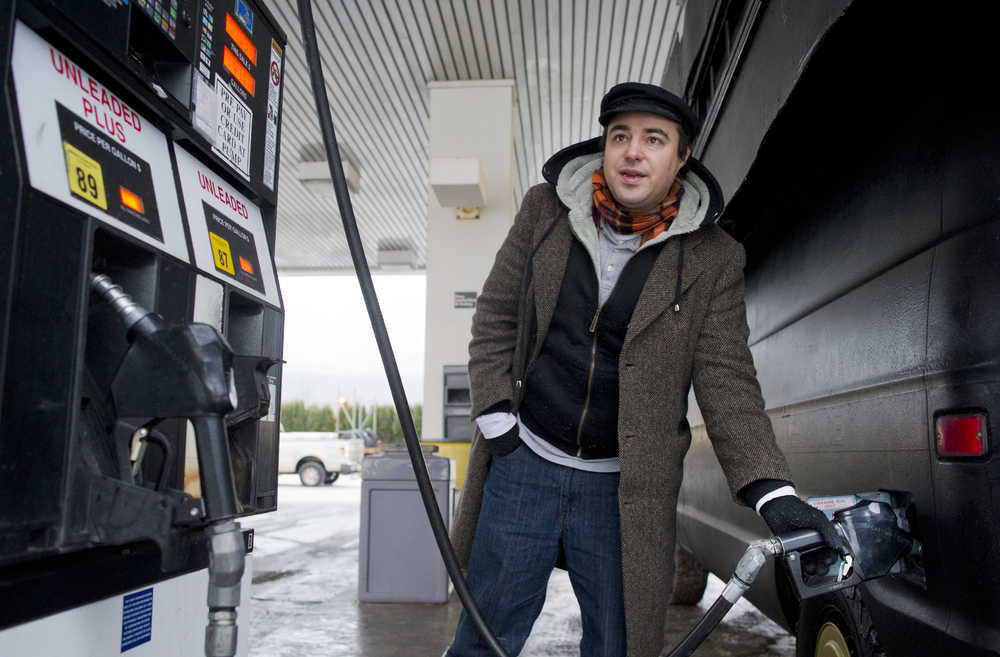Alaska’s gasoline taxes could triple by 2018 under a plan proposed by Gov. Bill Walker on Thursday.
The gas tax hike was included as part of Walker’s budget plan and follows a similar idea that the Alaska Legislature failed to vote upon last session.
Alaska has the lowest motor fuel taxes in the nation, but lawmakers have been reluctant to approve tax increases of any kind. Last session, the only notable revenue increase was a hike in hunting and fishing fees.
Walker’s fuel tax proposal calls for increasing the gasoline tax from 8 cents per gallon to 16 cents per gallon on July 1, 2017. On July 1, 2018, the tax would rise to 24 cents per gallon.
Taxes on boat fuel, aviation gas and jet fuel would also rise accordingly.
“We don’t feel like it makes us uncompetitive or is an onerous tax; it just makes us average,” said Alaska Revenue Commissioner Randall Hoffbeck on Friday by phone.
Alaska would still have below-average gasoline taxes, according to the federal U.S. Energy Information Administration. As of July 1, 2016, the national average for state gasoline taxes was 26.6 cents. Pennsylvania has the highest state taxes at 51.4 cents per gallon.
If Walker’s plan is implemented, an average driver (13,476 miles at 22.5 miles per gallon) would pay $95.83 more per year in state fuel taxes.
That would raise an extra $81 million per year, according to estimates from the Alaska Department of Revenue. Alaska’s budget deficit would be $2.78 billion if the Legislature approves Walker’s proposed budget cuts but doesn’t enact any new revenue. In addition to the gasoline tax hike, Walker has proposed using a portion of Permanent Fund earnings for state services.
Last year, Walker proposed to simply double the gasoline tax. House Bill 249 never advanced from the House Transportation Committee, and when the bill was revived in each of the Legislature’s special sessions, it never received a vote of the full House.
Walker will introduce versions of the tax increase in both the House and the Senate.
“We brought it back mostly because it makes a lot of sense,” Hoffbeck said, but also because the gas tax hike — unlike others proposed by the governor last year — got a little bit of support.
“This one had the most traction last year; this one looked like it might move last year but ultimately didn’t,” Hoffbeck said.
One of the concerns raised during Legislative debate last year was that the new tax revenue would simply go into the state’s general fund. Gas tax revenue currently can end up paying for unrelated things like schools or health care.
In this year’s proposal, Walker would create a “transporation maintenance fund” to collect gas-tax proceeds.
That fund would be used for “direct capital, operating, or maintenance costs of highways and highway infrastructure,” including the Alaska Marine Highway. Boat fuel taxes would go into a subaccount reserved for port projects, and aviation fuel taxes would be reserved for airport projects.
“By designating those funds, we hope to give people a little more comfort,” Hoffbeck said.
The new proposal affects aviation fuel taxes slightly different than last year’s proposal did. Last year’s bill incorporated recommendations from a state aviation advisory panel to increase taxes more on jet fuel than aviation gas, which is used in smaller aircraft. That led to opposition from major airlines, including Delta and Alaska, as well as a national air cargo lobbying organization.
This year’s bill simply doubles, then triples existing aviation fuel taxes.
Last year, Rep. Les Gara, D-Anchorage, successfully amended Walker’s gas-tax hike to include triggers based on the price of North Slope crude. If crude prices were high and the state was earning more oil revenue, the gas tax would fall.
Walker’s new proposal doesn’t include those triggers.
“We would like to see these taxes permanent,” Hoffbeck said, explaining that if Gara’s triggers were implemented, the state might not know how much money it would earn in a given year.
“If somebody proposes a trigger and that’s the only way to get it passed, we’ll deal with it,” Hoffbeck said. “We see it as a lot cleaner to make the tax rate change permanent.”
• Contact reporter James Brooks at 523-2258 or james.k.brooks@juneauempire.com.
Clarification: Initial documents supplied by the governor’s office indicated the tax bill would be submitted first to the Senate. A Walker spokesperson clarified Monday that the bill will appear in both bodies of the Legislature simultaneously.
Correction: If Walker’s plan was implemented, an average would pay $95.83 more per year in state fuel taxes. A previous version of this story calculated the additional cost as more than $130.

